As a small business with limited budgets, smaller teams, and fewer tools, how do you create a social media plan that moves the needle?
With a diversified audience across different social media platforms, small businesses can’t afford a one-size-fits-all approach.
That’s why we built this guide to show you how to do social media marketing for your small business that can transform your followers into leads and content into conversions.
We’ll cover proven strategies that work across different platforms, from Pinterest boards to Instagram’s trending reels.
And to help you get started right away, we’ve created a free template you can use to plan your strategy as you read along.
Let’s dive in!
Strategy 1: Set Clear, Measurable Goals
Your social media efforts need direction, even if you’re just starting out. Setting clear goals helps you stay focused and ensures every post serves a purpose.
For small businesses, this isn’t about chasing vanity metrics – it’s about defining what success looks like for your business.
Break down your goals into quarterly objectives and monthly targets. Think beyond follower counts: Are you looking to drive website traffic? Generate leads? Boost local awareness? Each platform should have its own specific goals aligned with your business objectives.
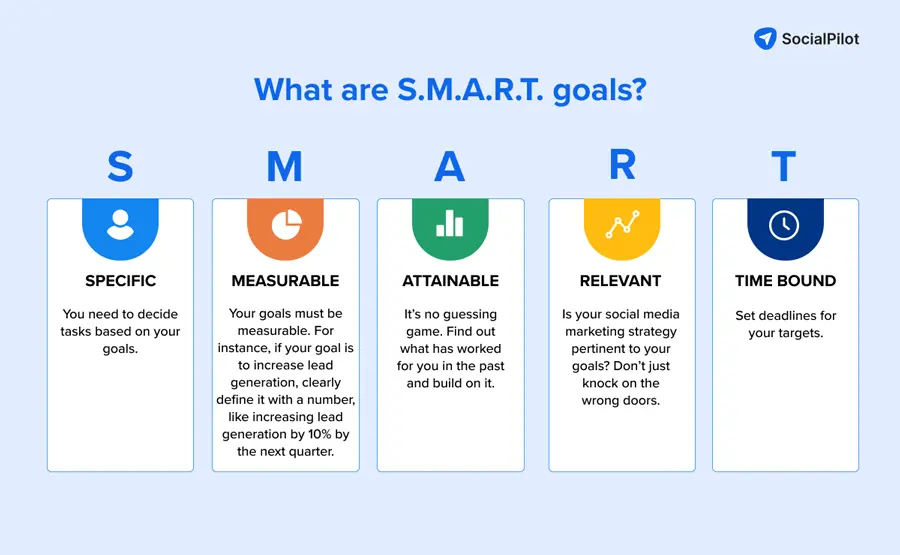
You can also start out by making SMART (Specific, Measurable, Achievable, Relevant, Time-bound) goals. For instance, instead of “increase engagement,” aim to “achieve a 5% engagement rate on Instagram business posts by the end of Q2.” This clarity helps you track progress and adjust your strategy as needed.
Strategy 2: Know Your Audience Inside Out
The foundation of your social media strategy starts with understanding your audience deeply. You need to know their pain points, desires, and how they communicate.
Marketing strategist Emily Hirsh puts it perfectly on the social media marketing podcast.
“What is the core outcome that your business solves for somebody? It’s important to answer that in clear, one sentence, using the language that your ideal customer would actually say.”
When you’re building your social media strategy, ask yourself:
- What problem does your small business solve?
- Can you describe your value proposition in a single, compelling sentence?
- Are you using the exact words your ideal customer would use?
This isn’t about crafting a fancy pitch. It’s about communicating your solution in language that resonates with potential customers.
Strategy 3: Target Multiple Platforms
Social media marketing isn’t just about nailing one platform anymore. The competition is diverse. This makes it more important than ever not to rely on a single social media platform.
“You don’t have to be doing everything, but you need to be doing one thing really, really well and consistently. The key is creating good content—valuable, helpful content. It also depends on what you do best, such as videos, podcasts, or writing. Pick one and dominate it, but don’t put all your eggs in one basket. Your audience might be on Instagram, LinkedIn, or YouTube—so you have to think about where your people are and make sure you’re there too,” says Melinda on the SocialPilot podcast.
This also emphasizes how as a small business, you can’t just put your content up on one platform and expect people to find it. Instead, you need to understand your audience’s search habits and how you can make sure that your content exists in all the places that they’re searching.
Let’s break down the key platforms you can establish your presence in:
Instagram has evolved into a social media platform where video content leads, but multiple formats thrive.
From Stories to Reels, feed posts to carousels, the platform offers diverse ways to showcase your product or brand. For small businesses, this means having a rich content mix with a strategic emphasis on video, given its current algorithmic favor.
In fact, the stats speak for themselves. Video content on Instagram might just have the upper hand on Instagram, as per our trends report 2025:
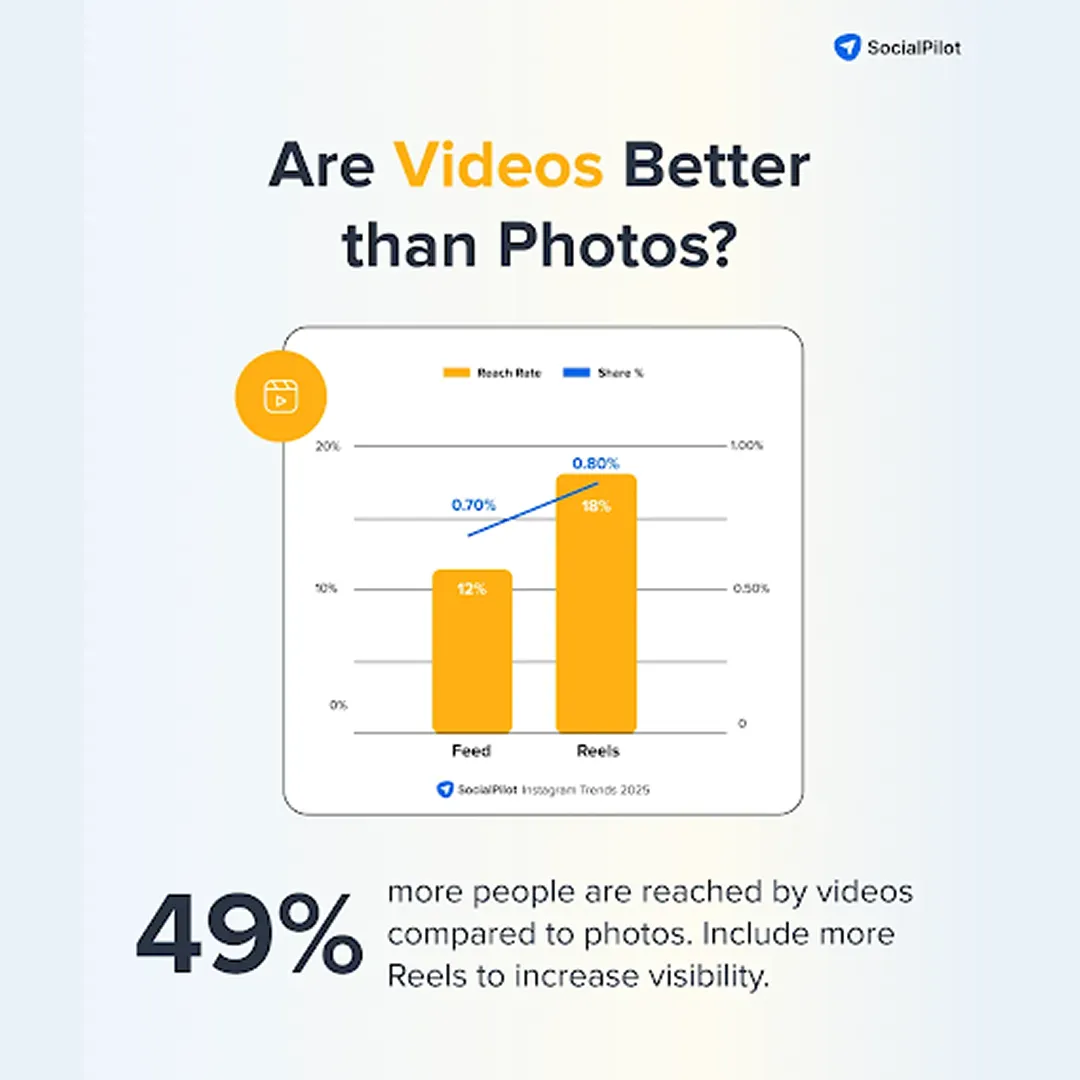
For instance, here’s how Fable, an app for book lovers and TV show aficionados, uses a mix of carousels and reels for its social media feed:

The key is understanding each format’s strengths. It’s best to use Reels for trending content and carousels for in-depth information. Use Stories for day-to-day connections with your audience.
Tip: Use Instagram Insights to identify which content formats perform best with your specific audience. You can then adjust your strategy accordingly.
Threads
Threads has emerged as a text-first platform, perfect for storytelling. The platform thrives on interaction and rewards businesses that engage in real conversations. Hence, it’s best to focus on engaging posts and interacting with your followers’ responses.
For example, here’s how a small business owner, Casey, posts and engages with her followers on Threads:
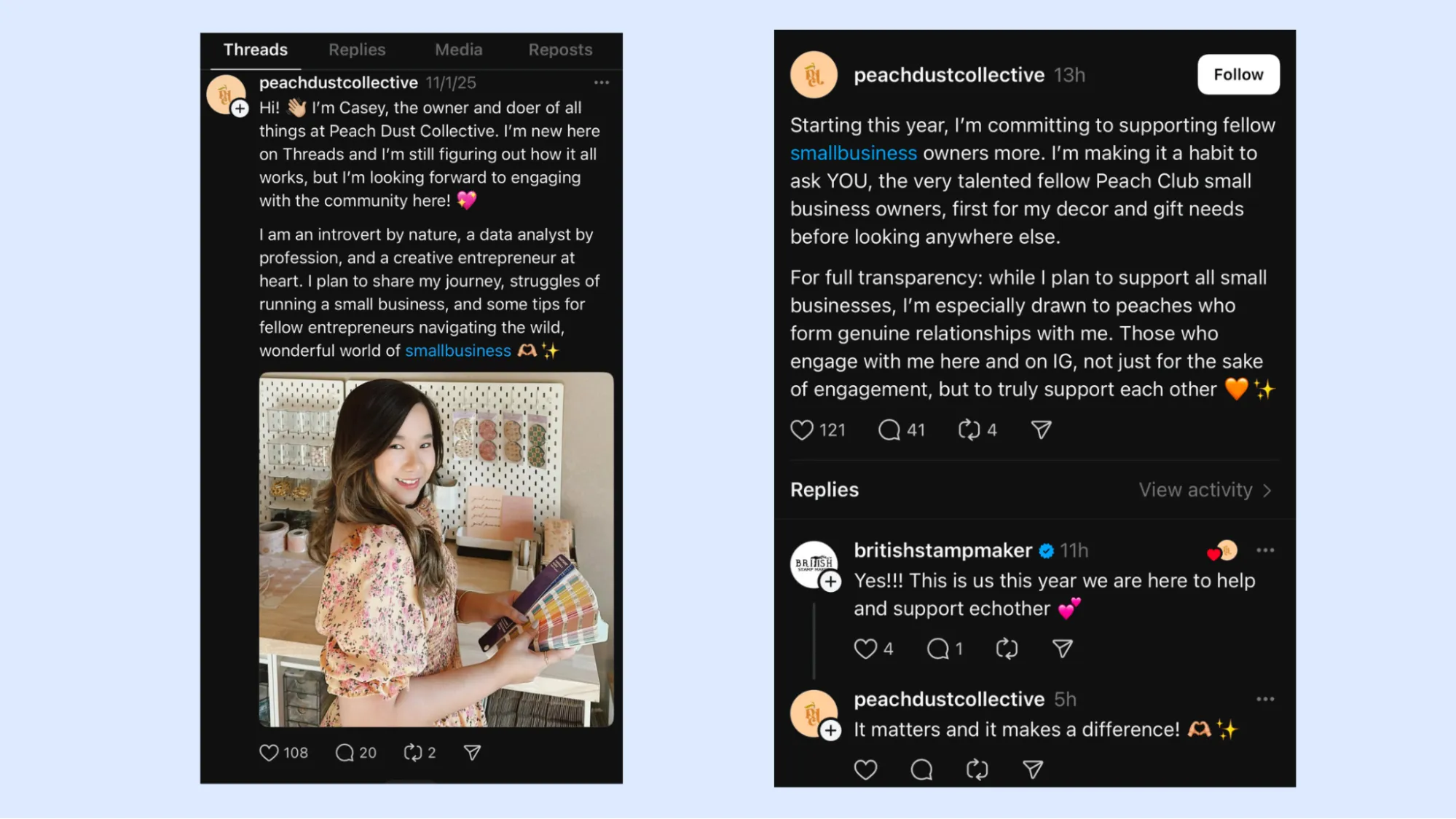
The platform has a chronological feed and focuses on conversations. This makes it ideal for sharing behind-the-scenes glimpses of your business, insights, and customer stories.
Think of Pinterest as a visual search engine where content drives traffic, even months after posting.
As a small business, you can use it for long-term content strategy. Focus on visually appealing, high-quality images and infographics that solve problems or inspire. It could be product showcases, how-to guides, or inspirational content. The key is to make sure each pin leads to something worthwhile.
For example, here’s how Headspace uses Pinterest boards and has a curated feed to drive traffic:

Ultimately, Pinterest is a platform where users come with the intent to discover and save ideas. So make your content worth being ‘pinned’ and shared.
LinkedIn is a professional networking space where business content truly shines. For small businesses, it’s an outlet to build B2B relationships and engage in thought leadership.
You can also share business stories, industry expertise, and company milestones. Whether it’s long-form articles or employee spotlights, focus on content that adds professional value.
For instance, here’s how Peanut, a social platform for mothers, uses LinkedIn to share updates or related content:
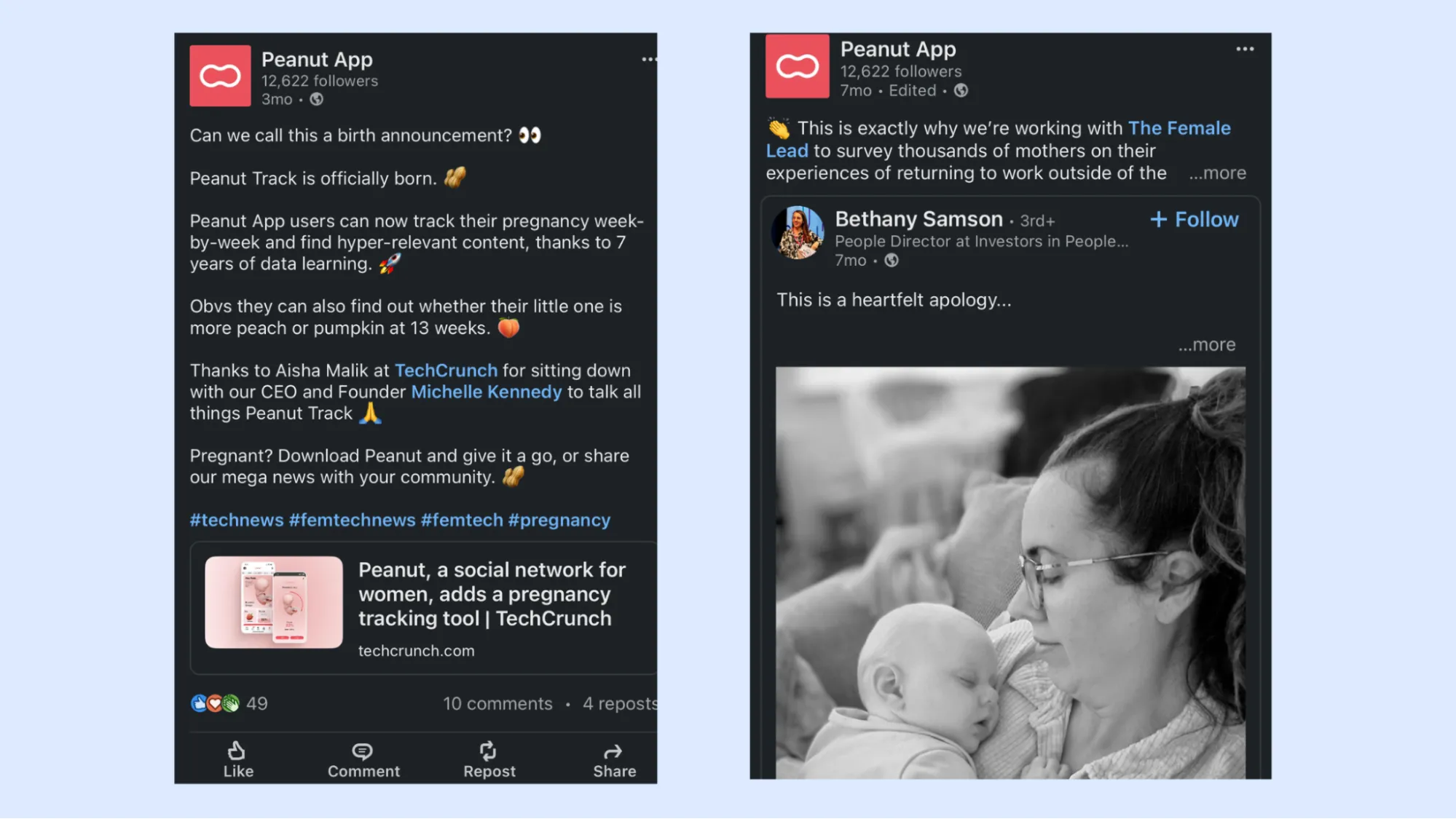
Tip: Encourage your employees to share company content with their networks. Using employee advocacy can help increase your organic reach.
X (Twitter)
X, formerly Twitter, excels at real-time conversations and instant engagement. For small businesses, it’s a place for customer service, building brand personality, and participating in trending discussions.
Your content can gain instant traction when it resonates with the right audience via retweets and posts. The platform rewards businesses that stay active in conversations and respond promptly to mentions.
For instance, here’s how POPFLEX, an activewear brand, uses X to engage with their audience or repost content from their founder:
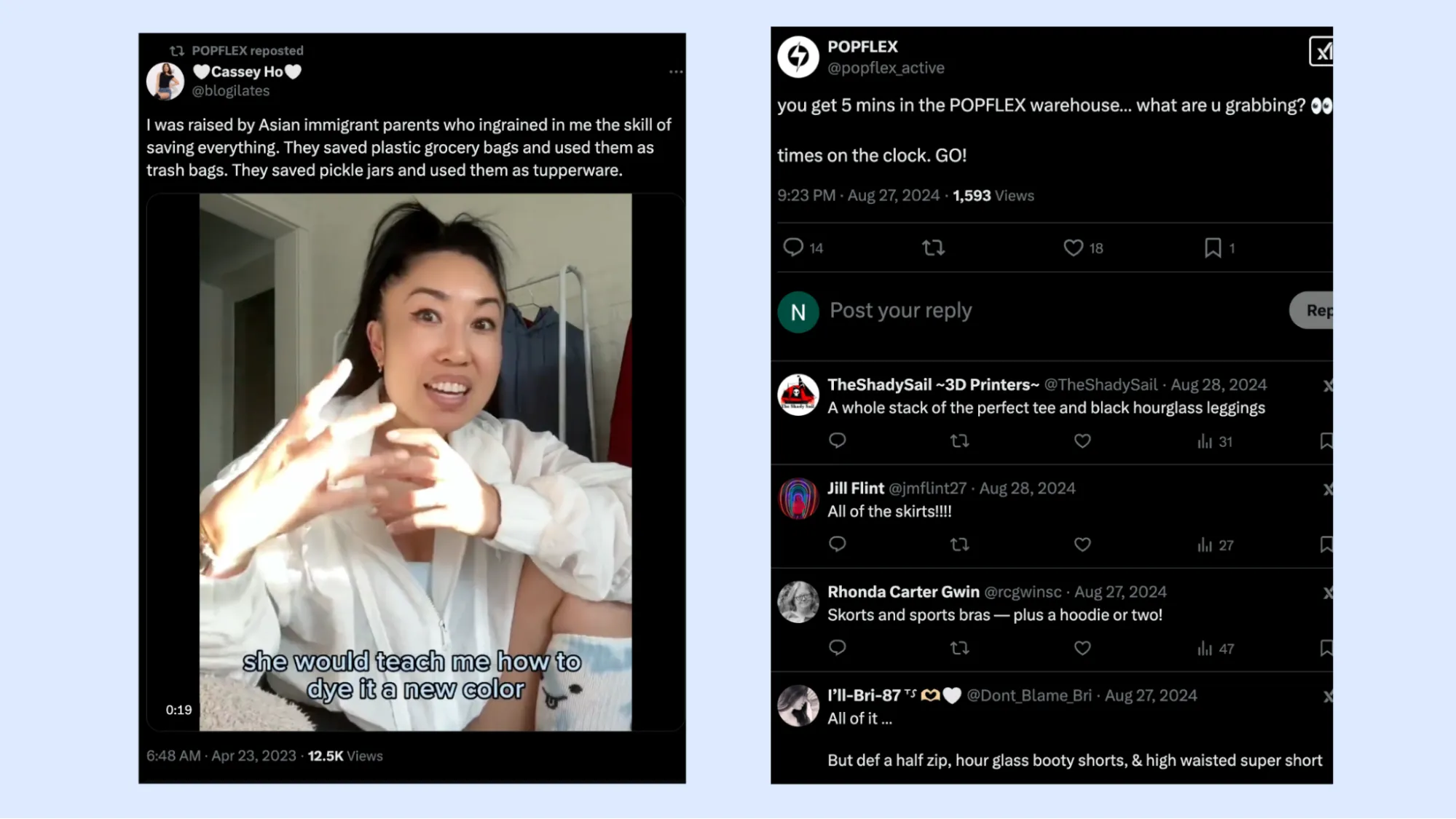
The takeaway? Create a mix of original content, retweets, and replies to build your small business’s presence on X.
Despite being one of the older platforms, Facebook remains a good option for small business marketing. Especially for local businesses, the platform’s targeting options and content formats are a bonus.
Your business can share customer success stories or go live with product demonstrations. You can even create engaging polls to understand your audience better.
For example, Mokobara uses Facebook to promote their products, collaborations or holiday offers.
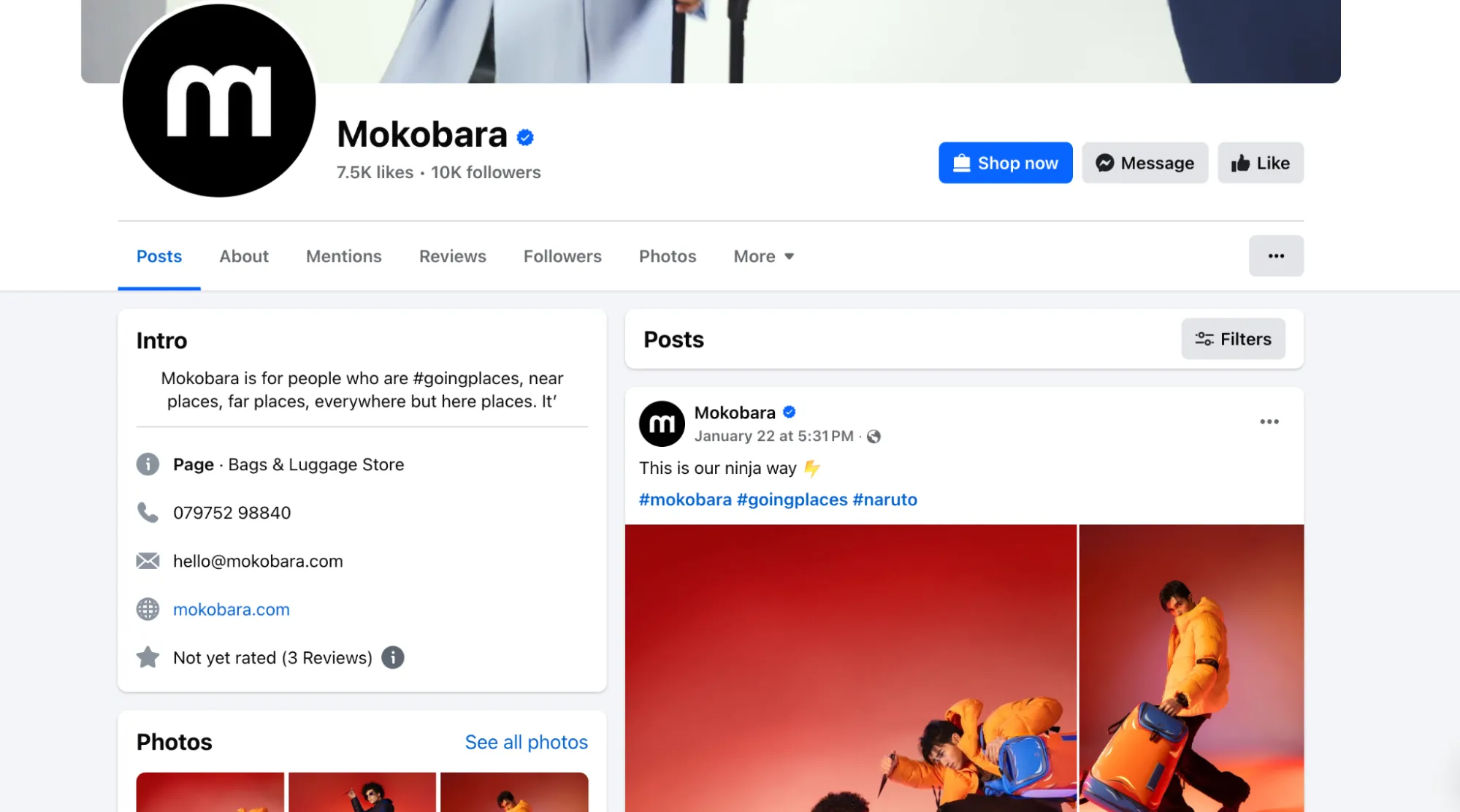
YouTube
YouTube isn’t just another social platform – it’s the world’s second-largest search engine. For small businesses, this means huge potential for discoverability.
As a small business, you can use Youtube for:
- Creating how-to videos related to your products or services
- Sharing behind-the-scenes looks at your business
- Developing expert tutorials in your niche
- Collaborating with influencers in your product category
Infact, it’s also advised to follow the 80/20 rule that Brock Johnson talks about on our Youtube Masterclass.
“80% of your energy and effort should be placed on the first 20% of the video because ultimately, it is the beginning of the video that will get someone to continue watching the rest of it.”
This tactic can even help boost impressions and click-through rates, as users generally continue watching the video when the hook is enticing enough.
For instance, here’s how Verve Coffee uses Youtube to promote their content mix:
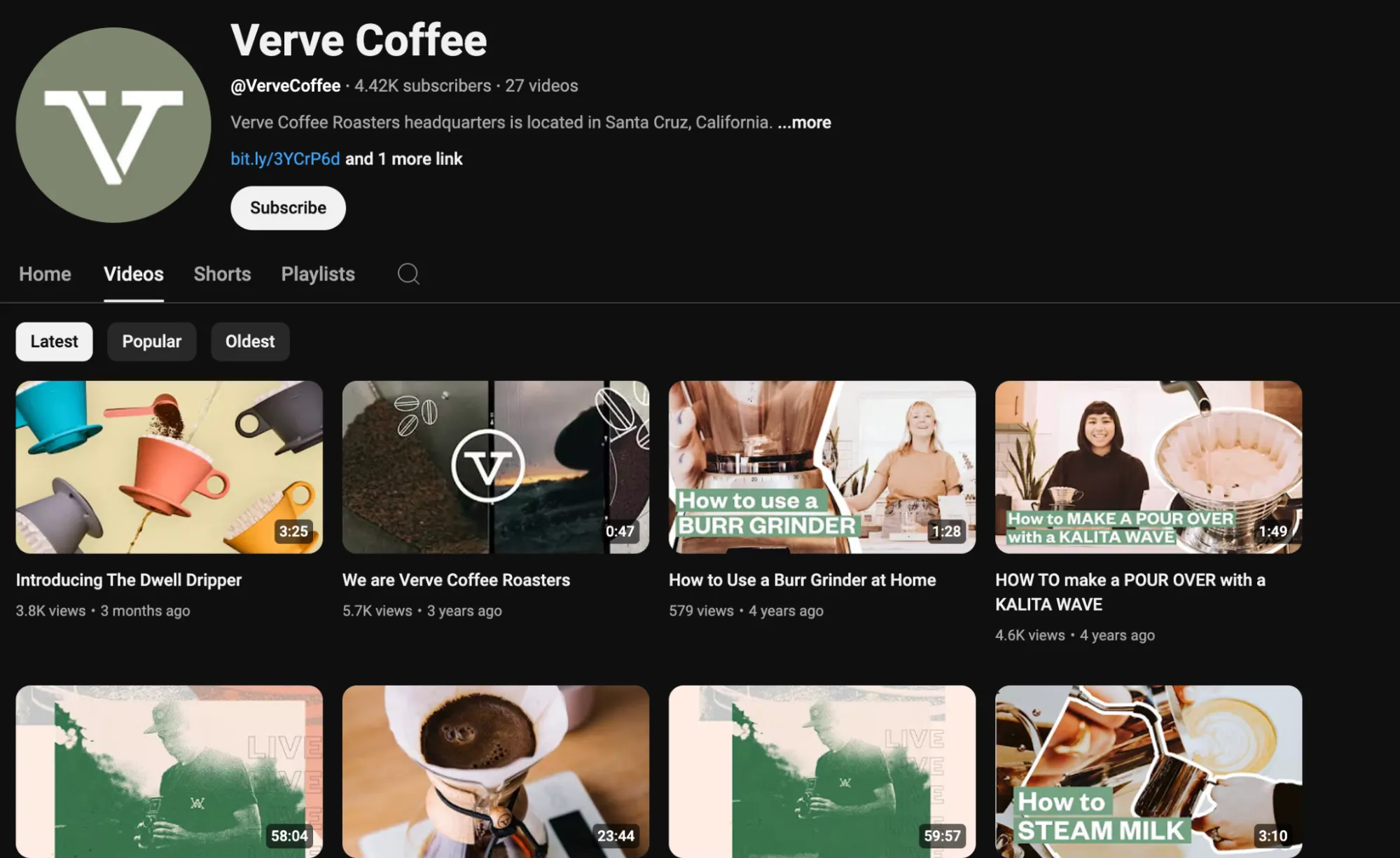
They have a mix of how-to content, along with product-related videos to educate their audience.
For small businesses venturing into YouTube, remember that consistency matters more than perfection. Set a realistic posting schedule, even if it’s just once a month. You can then focus on creating content that truly helps your target audience solve their problems.
Tip: Don’t get hung up on production value early on. Start with simple, helpful videos shot on your phone. What matters most is providing value to your audience.
Remember, the goal isn’t to be everywhere at once. Choose the platforms where your target audience is most active and focus on mastering those first. As you grow, you can expand your presence to other platforms strategically.
Strategy 4: Develop a Content Calendar
Creating a social media content calendar is crucial, whether you’re a solo entrepreneur or have a small team. It helps you plan content and stick to a schedule.
As Heidi Schmidt explains on the Stop the Scroll podcast: “Think of your content calendar as mission control: it helps you balance different content pillars, manage posting frequency across platforms, and ensure you’re hitting all your marketing objectives.”
Spreadsheets are a great starting point. In fact, you can download our free social media calendar template to map out your content strategy. This template helps you plan out when to post, what themes to cover, and how to balance unique vs. curated content—all while saving you time and minimizing stress.
However, if you’re managing multiple platforms, coordinating with a team, or running time-sensitive campaigns, you might want to consider using our social media calendar feature instead. It has the upper hand over spreadsheets and helps with robust content planning and team collaboration.
Let’s face it – juggling content across platforms while keeping your team in sync is a common headache That’s where SocialPilot’s content calendar comes in handy.
With drag-and-drop scheduling, built-in holiday calendars, and smooth team collaboration, you can manage your entire social media strategy without the chaos. When you need to keep posts on multiple platforms, SocialPilot’s got your back so you can focus on what really matters- growing your brand.
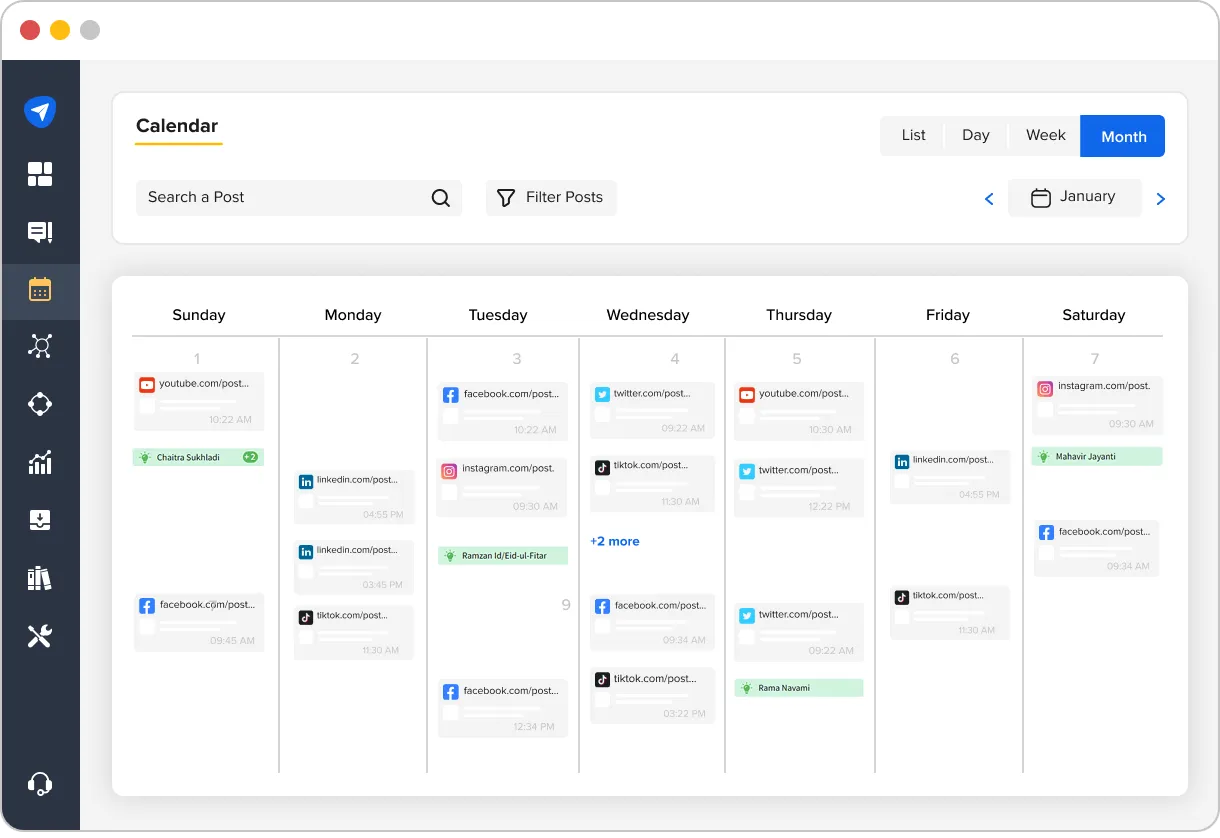
Strategy 5: Mix Up Your Content Strategy
Small businesses often fall into the trap of monotonous content creation. With the limited time and resources, pushing out similar or specific content formats may make sense to continue the publishing pace.
But what if we told you there’s a way around it?
The key is developing a “Custom Content System”.
“Figure out what existing content you already have that’s high performing and working well,” advises Emily Hirsh. “Then figure out how that current content can be repurposed, reused, and can fill gaps in your process.”
A custom content system is exactly this: figuring out the content mix that works for your business and includes:
- Educational posts that provide value
- Trend-driven content that shows your brand is current
- Engagement-driven posts that build community
- Promotional material that drives sales
However, if you’re looking for ideas on the type of content to include, here’s an example known as the 80-20 rule. This is where 80% of your posts are informative, educational, and entertaining. 20% of your content should be to promote your product and brand.
For instance, Rhode, a skincare brand based in the US, follows this rule. They have educational posts on their feed, accompanied by promotional ones as well.

Regardless of the rule or example you follow, the bottom line is this: Your content mix isn’t just about posting different formats. It’s about using them strategically to engage your audience.
You can shed some burden by automating and optimizing your content strategy using SocialPilot’s scheduling functionality. Instead of manually posting each time, you can:
- Repeat high-performing posts to maximize reach.
- Stagger content across different time slots for better engagement.
Learn how to automate your post.
By using automation, you save time and ensure your audience always gets a steady flow of fresh and engaging content, without the stress of manual posting.
Strategy 6: Maintain Consistency
Regardless of the social media platform, all algorithms reward consistency. Consistency in turn, boosts engagement, which positively affects your brand’s performance on the platform.
As a small business, when more demanding tasks take over, you may be inconsistent or take breaks from social media. But here’s the issue: You mainly risk losing your spot in followers’ feeds and their habit of engaging with your content.
This is exactly where tools like SocialPilot can help. Instead of manually managing posts across platforms, you can schedule content in advance and maintain a steady presence even during your busiest periods.
As a small business, it’s best to have a posting schedule to maintain consistency. Start small and strategic. Experiment with content types and posting schedules, and monitor results. This lets you see what type of content and timing resonate with your audience.
Begin with 2-3 posts per week at peak engagement times for your audience. You can then finalize a posting schedule that works best for your business based on engagement metrics.
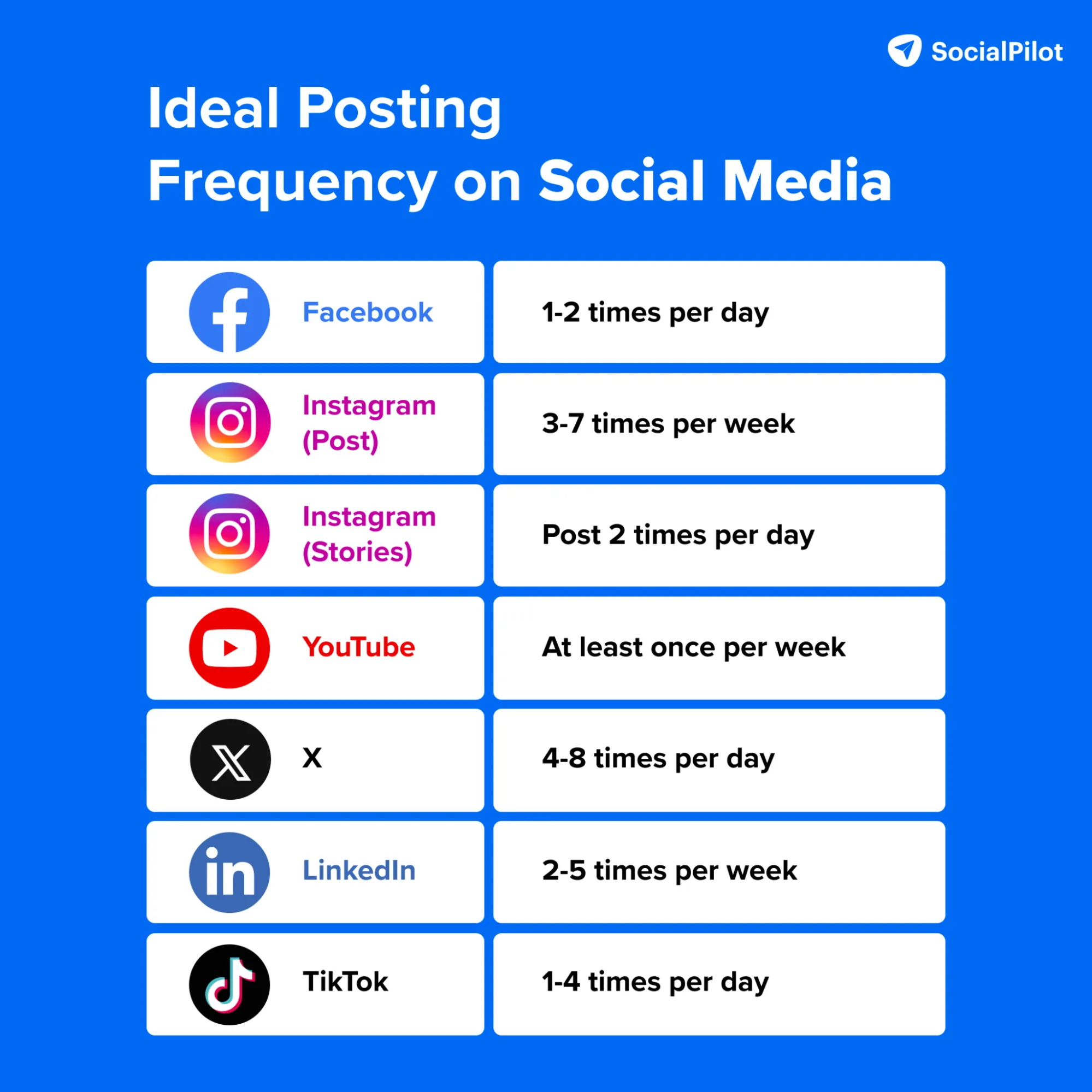
And if you’ve been absent on the platform for a while or taken a break from posting, don’t apologize or make a big deal of it. Use re-engagement tactics such as jumping back on schedule or re-sharing your best-performing content to get back on track.
Strategy 6: Use AI to Power Your Content
AI tools have made it possible for small businesses to produce quality content without a large team or budget.
The key is using AI strategically to enhance your creativity, not replace it.
Focus on using AI for the time-consuming parts of content creation. Take social media captions, for instance – while they can make or break your post’s performance, crafting the perfect caption for every post takes considerable time and effort.
That’s where AI tools like SocialPilot’s Instagram Caption Generator come in, helping you create compelling hooks and captions on Instagram, making your viewers stop scrolling and drive engagement.
Instagram Caption Generator
Generate scroll-halting Instagram captions with our AI-powered Instagram Caption Generator.
Here is the Generated Result

Create More for Free!
Get 500 Credits to Generate AI Content!
Since you’re an AI fanatic, we are offering you 500 Free Credits to generate awesome content on the AI Assistant of SocialPilot.
Beyond captions, AI can also help with other aspects of your content creation process. Use tools like ChatGPT for content ideation and planning, or leverage AI image generators to create visually appealing graphics when you don’t have access to professional photography.
You can even analyze your social media metrics via AI and create charts and reports for better visualization of your targets.
The goal is to use AI tools strategically to enhance your workflow while maintaining your brand’s authentic voice. Ideally, AI should function as your assistant rather than a replacement for a role.
“Use AI for brainstorming ideas or drafting content, but always review and edit to ensure it matches your brand’s voice,” shares Katie Murphy in our recent social media trends webinar.
This way, you can maintain consistency and quality across platforms without getting overwhelmed by content creation demands.
Let’s talk about the elephant in the room: social media analytics. Yes, numbers can be overwhelming. But here’s the thing—if you don’t jot down the metrics, there is no way to track your performance.
Before you create that next viral reel or witty post, let’s get something straight. You need clear, measurable objectives tied to actual business outcomes.
What works like magic on Instagram might fall flat on LinkedIn, and that’s exactly why each platform needs its own success metrics.
Brian Piper says on the social media marketing podcast, “If you’re really looking to improve your bottom line or your revenue, then you need to track the most relevant information, such as conversions or engagement on social media.”
But remember- you don’t need to track everything. Start with the metrics that directly tie to your business goals. Are you looking to drive website traffic? Focus on click-through rates. Want to build brand awareness? Monitor reach and engagement rates.
Here are some key analytics you should focus on:
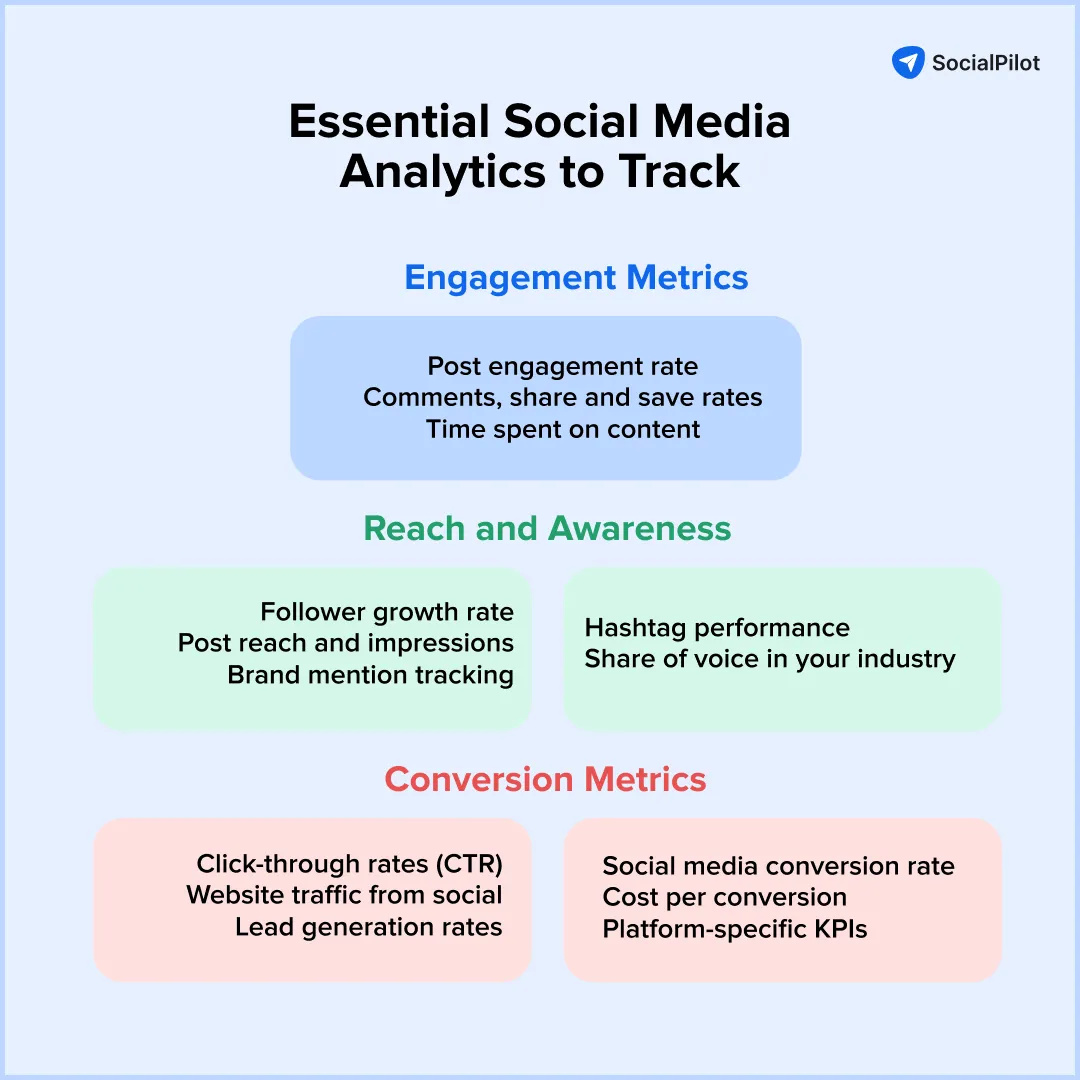
Lastly, conduct regular social media audits. This helps you identify what’s working and where to pivot. Start small, track consistently, and let data guide your strategy.
The Next Step: Implement your Social Media Strategy
Building a strong social media presence doesn’t require a massive marketing team. The strategies we’ve covered can be implemented by businesses of any size.
But managing multiple platforms and creating consistent content can quickly become overwhelming. This is where smart automation becomes your ally. Instead of spending hours on manual posting, a social media management tool like SocialPilot can help.
Imagine scheduling a month’s content in advance, tracking performance across platforms in one dashboard, and posting at optimal times—all while focusing on growing your business.
You end up converting recurring tasks into manageable, measurable actions that drive real results. The result? Your future self (and your business) will thank you.
Start with a free trial or schedule a demo to experience Socialpilot yourself. Easily schedule your content calendar, analyze your performance, and maintain a consistent presence across all your chosen platforms.



-min.png)
